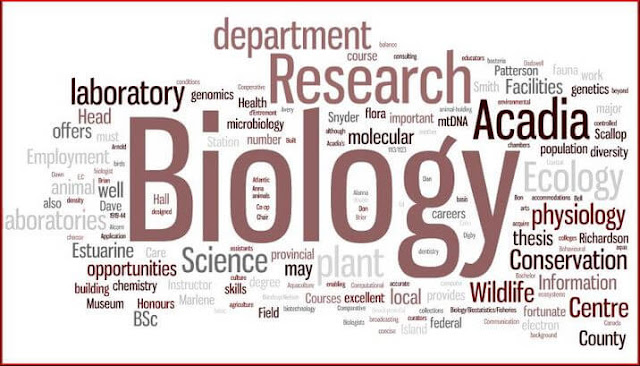73 branches of Biology that you should know
Branches of biology are the study-study of living beings are more specific groups or specific parts of a living being.The specific group of a particular living being such as herpetology specifically examines the Group of reptiles.
It could also specifically against certain parts of the body of the living thing as the science of Cytopathology examines the special about the cell.
A large number of lifeforms and the complexity of the explanation of life. Then very reasonable if the branch of biology very much. Here are 73 branches of biology and the sense of brevity we auto-summary from various sources.
Branches of biology
1. Aerobiology: the science of organic particles in the air
2. Agriculture: Science of the production process yields and more emphasis on its application, for example read: Sustainable Agriculture
3. Agronomy: Science of plant cultivation
4. Algology: Science of algae
5. Anatomy: the science of structure of body parts in living things
6. Andrology: the science about the kinds of hormones and reproductive abnormalities in men
7. Astrobiology: (called exobiology, exsopaleontologi and bioastronomical): about evolution, distribution, and future of life in the universe
8. Bacteriology: the science of bacteria
9. Biophysics: Science of biological processes in terms of physics, by applying the theories, and methods that are traditionally used in the physical sciences
10. Biogeography: the science of species distribution in the context of time
11. Bioinformatics: Science on the use of information technology to research, collect, and store biological data or genomic data other
12. Biochemistry: science about the chemical reactions necessary to life function, usually at the level of cellular.

13. Biology: the science of the environment indoors
14. Marine Biology (or biological oceanography) – the study of ecosystems, plants, animals and other ocean life
15. Conservation Biology: the science of preservation, protection and restoration of the natural environment, natural ecosystems, vegetation, and wildlife
16. Environmental Biology: the science of the natural world as a whole or in certain regions, especially human impact on it
17. Molecular Biology: the science of the study of biology at a molecular level
18. Cell biology: the science of the cell as a whole unit, molecular interactions, and chemical reactions which occur within the cell
19. Biotechnology: science about the usage of the application of biological processes in an integrated process which include biochemistry, microbiology, chemical engineering for the food and the improvement of human welfare.
20. Botany: plant science
21. Bryology: Science of MOSS
22. Dendrology: the science of trees or other woody plants
23. Ecology: Science of reciprocal relationships or interactions between living things with the environment
24. Embryology: the science of embryonic development
25. Endocrinology: Science of hormones
26. Entomology: insect Sciences
27. Enzymology: Science of enzymes
28. Epidemiology: the science of disease transmission
29. Eugenics: the science of the law of inheritance
30. Evolution: the science of living body structure changes slowly in a long time
31. Pharmacology: the science of medicine
32. Physiology: the science of bodywork/function fail
33. Physiotherapy: the science of treatment against the sufferers experiencing paralysis or muscle disorders
34. Population genetics: the science of change in gene frequencies in a population of an organism
35. Genetics: the science of inheritance
36. Herpetology: Science of reptiles/snakes
37. Hematology: the science of blood
38. Hygiene: the science of health care of living things
39. Histology: the science of networks
40. Ichthyology: the study of fish
41. Immunology: the science of the immune system (immune) body
42. Cardiology: the science of heart and blood vessels
43. Carcinology: Science of crustaceans
44. Climatology: the science of climate
45. Limnology: the science of waters flowing
46. Malacology: the science of mollusca
47. Mammalogy: Science of mammals;
48. The science of Mycology: fungi
49. Microbiology: the science of microorganisms
50. Morphology: the science of form or characteristics outside the organism
51. Nematology: the study of nematodes
52. Neurology: the science dealing with irregularities in the nervous system
53. Oncology: the study about cancer and ways of prevention
54. Ontogeny: Science on the development of living things of the Zygote into adulthood
55. Organology: the study of organs
56. Ornithology: the science of birds
57. Palaeontology: the science of fossil
58. Paleobotany: plant science of the past
59. Paleozoology: Science of the ancient animals
60. Parasitology: Science of parasitic creatures
61. Pathology: the science of diseases and its influence on human
62. Phylogeny: Science on the development of living things
63. Primatology: Science of primates
64. Protozoology: Science of Protozoa
65. Pulmonology: the science of lung
66. Radiology: science to see the inside of the human body using a steady stream of good waves, radiation or electromagnetic waves or Wave mechanics
67. Genetic engineering: the science of nature's genetic manipulation
68. Sanitation: science about environmental health
69. Cytology: the science of about cells, such as the difference in animal cells and plant cells
70. Taxonomy: the science of classification of living things
71. Teratology: Science of the defects of the fetus in the womb
72. The science of Virology: virus
73. Zoology: science about animals
We are aware that the 73 branches of biology above are far from the perfect words. There are still many branches of biology that we haven't been able to write.